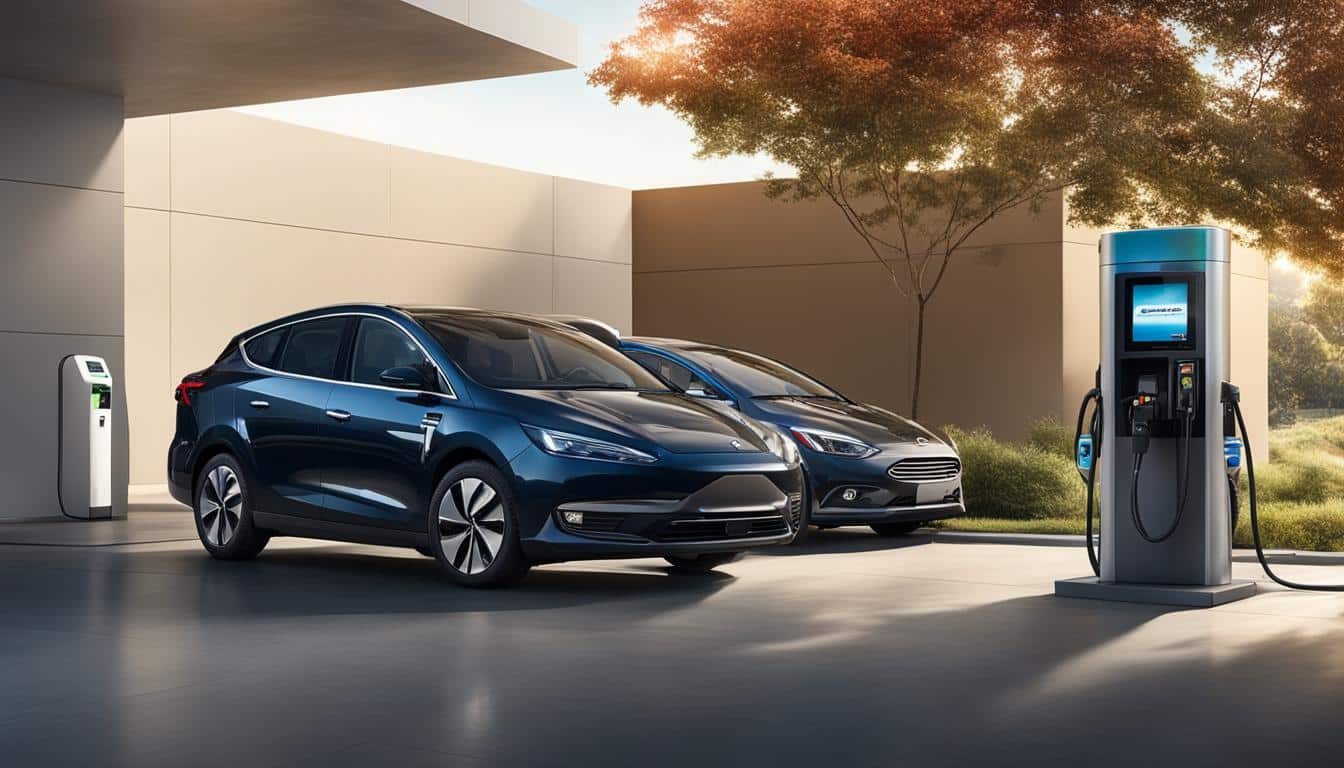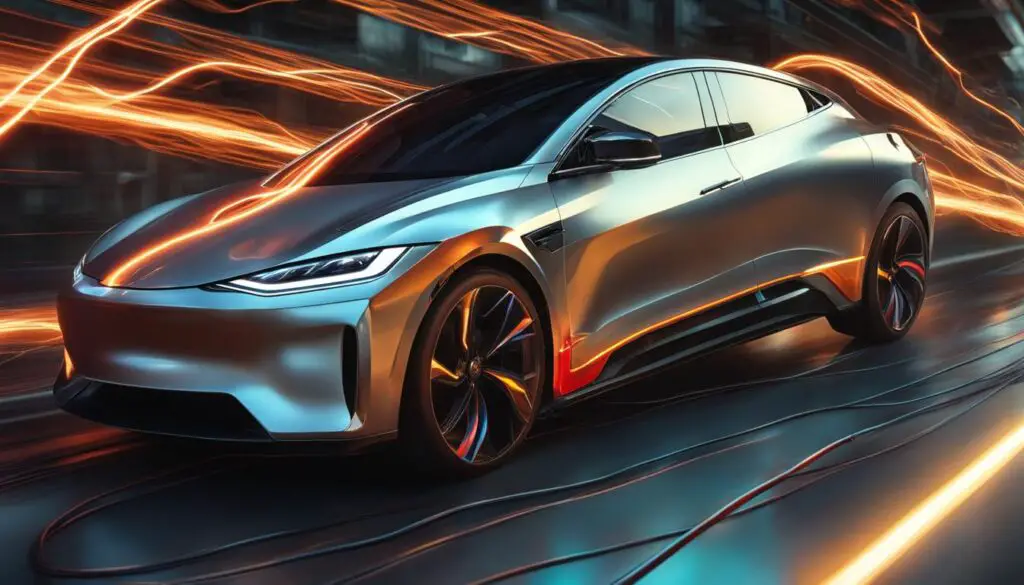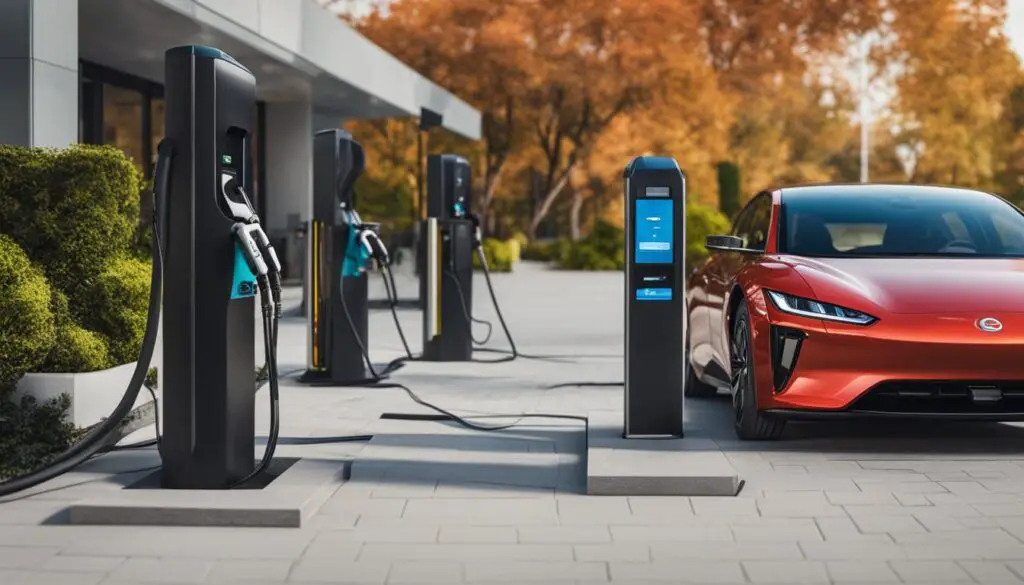
Charging vs. Refueling: What’s More Convenient, EVs or Gasoline Cars?
When it comes to comparing electric vehicles (EVs) to traditional gasoline cars, one factor that often comes up for discussion is the convenience of charging versus refueling. This consideration takes into account the time it takes to charge an EV compared to the time it takes to refuel a gasoline car.
EV charging times can vary depending on several factors, including the vehicle’s maximum charge rate, type (pure electric or plug-in hybrid), charge level (1, 2, or 3/DCFC), required range, ambient temperature, and more. In general, EVs can be charged overnight at home or at a public charging station in approximately 30 minutes. While this may seem slower compared to the quick refueling of a gasoline car, it’s important to look beyond just the charging time.
There are several advantages to EVs that go beyond charging time. For example, electric cars contribute to reduced air pollution and greenhouse gas emissions, helping to create a cleaner and more sustainable environment. Additionally, advancements in charging technology have made electric car charging more accessible, efficient, and time-effective.
Key Takeaways:
- EV charging times may be longer than refueling gasoline cars, but charging can often be done overnight or at convenient public stations.
- Electric vehicles offer environmental benefits by reducing air pollution and greenhouse gas emissions.
- Advancements in charging technology have made electric car charging more accessible and time-efficient.
- Electric cars generally have lower maintenance costs compared to gasoline cars.
- Overall, the convenience and benefits of electric car charging make it an attractive option for many consumers.
The Convenience of Electric Car Charging
Electric car charging has evolved significantly over the years, making it more accessible, convenient, and time-efficient. Today, you can charge your electric car at home, work, or at various public charging stations in cities worldwide.
The convenience lies in the accessibility and versatility of charging options. All you need is a charging cable to plug in your car, and you’re good to go. Some electric vehicles even offer wireless charging options where you can recharge your car by parking on a charging pad.
Charging your electric car at home allows for ultimate convenience and accessibility. It eliminates the need to visit a public charging station, providing the flexibility to charge your vehicle at any time. With the installation of a home charging station, you can conveniently charge your car overnight or whenever it’s most convenient for you.
Access to Public Charging Stations
In addition to home charging, electric car owners have access to an extensive network of public charging stations. These stations are strategically located in parking lots, shopping centers, restaurants, and other locations, making them easily accessible during daily routines.
Public charging stations offer a range of charging speeds, from slower Level 2 charging to faster Level 3 / DC fast charging options. This versatility allows EV drivers to choose the charging speed that suits their needs and time constraints. For example, if you’re in a hurry, you can opt for a fast charging station to quickly top up your battery.
The image above demonstrates the accessibility of electric car charging at a public charging station. It showcases the versatility of charging options, including Level 2 and Level 3 charging ports.
The convenience and reliability of public charging stations play a crucial role in eliminating range anxiety and ensuring you can easily travel longer distances in your electric car. As the charging infrastructure continues to expand, more stations are being installed along major highways and in urban areas, making it even more convenient to charge your electric vehicle on the go.
Wireless Charging
Wireless charging is an emerging technology that adds an extra layer of convenience for electric vehicle owners. With wireless charging, you can simply park your car on a charging pad, and the system will wirelessly transfer energy to your vehicle’s battery. This eliminates the need for physical cables, making charging effortless and convenient.
This innovative technology is not only convenient but also contributes to the overall accessibility of electric car charging options. As wireless charging becomes more widespread, it will further enhance the convenience and ease of owning an electric vehicle.
In summary, the convenience of electric car charging lies in the accessibility and versatility of charging options. Whether it’s charging at home, utilizing public charging stations, or embracing wireless charging technology, electric vehicle owners have an array of options to ensure their cars are always ready for the road.
The Time-Efficiency of Electric Car Charging
Advancements in technology have revolutionized the time-efficiency of electric car charging, making it faster and more convenient than ever before. With the introduction of fast charging technology, electric vehicles can now be charged up to 80% in just 20-30 minutes. This is a significant improvement compared to the four to six hours it used to take to charge an electric car.
Fast chargers, also known as Level 3 (DCFC) chargers, utilize higher voltage and power levels to deliver a rapid charging experience. These chargers make it possible to charge an electric vehicle quickly, allowing drivers to get back on the road in a short amount of time. This improved charging speed brings electric car charging more in line with the refueling time of traditional gasoline cars, making it a viable option for drivers who value time-efficiency.

In addition to fast charging, advancements in technology have also led to improved charging speeds across different charging levels. Level 2 chargers, commonly found in residential areas and workplaces, have seen improvements in their charging output, reducing the time needed to fully charge an electric vehicle. Level 1 chargers, which are often used as a backup option or for slow overnight charging, have also become more efficient.
_”With fast charging and advancements in technology, electric car charging has become a time-efficient process, ensuring drivers spend less time waiting and more time on the road.”_
These advancements in technology have not only improved the time-efficiency of electric car charging but have also expanded the infrastructure of charging stations. More public charging stations are being installed, offering drivers convenient locations to charge their electric vehicles. This increased availability of charging stations further enhances the overall time-efficiency of electric car charging.
In conclusion, the time-efficiency of electric car charging has significantly advanced thanks to fast charging technology and overall improvements in charging speeds. With faster charging times and an expanding charging infrastructure, electric vehicle owners can enjoy a seamless charging experience with minimal waiting times, making electric cars a practical and viable option for daily transportation needs.
The Economic and Environmental Benefits
Charging an electric car is generally more affordable than refueling a traditional gasoline car. Electric car owners can save up to 50% on fuel costs compared to their gas-powered counterparts. Additionally, electric cars have a significantly lower carbon footprint, as they produce zero emissions while driving.
The cost savings and environmental benefits make electric car charging an attractive option for many consumers.
Cost Savings
Switching to an electric car can result in substantial cost savings. On average, the cost of charging an electric vehicle is significantly lower compared to the cost of refueling a traditional gasoline car. The exact savings depend on the cost of electricity and fuel in your region, but studies have shown that electric car owners can save up to 50% on fuel costs.
“A study conducted by the Electric Power Research Institute (EPRI) found that electric vehicles cost about half as much to fuel as their gasoline counterparts, resulting in significant savings for drivers.”
Environmental Impact
One of the key advantages of electric cars is their positive impact on the environment. Unlike gasoline cars, electric vehicles produce zero emissions while driving. This helps to reduce air pollution and minimize the contribution to climate change. By choosing to charge an electric car instead of refueling a traditional gasoline car, owners can make a significant difference in reducing greenhouse gas emissions.
- Electric cars produce zero tailpipe emissions
- They contribute to cleaner air and reduced pollution in urban areas
- They minimize dependence on fossil fuels
Overall, the combination of the cost savings and the environmental benefits makes electric car charging an attractive option not just for individuals but also for businesses and governments looking to promote sustainability and reduce their carbon footprint.
Maintenance Costs for Electric vs. Gas Cars
When considering the maintenance costs of electric vehicles (EVs) compared to gas-powered cars, it becomes evident that EVs require significantly less maintenance, resulting in cost savings for the owners. The absence of spark plugs and the reduced need for oil changes contribute to the overall lower maintenance requirements of electric cars.
One of the primary advantages of EVs is their simplified drivetrain. Without an internal combustion engine, electric cars have fewer moving parts that can wear out or require regular servicing. This leads to fewer visits to the mechanic and reduced maintenance expenses over time.
The regenerative braking feature in electric cars is another aspect that distinguishes them from their gasoline counterparts. With regenerative braking, the electric motor acts as a generator, converting kinetic energy into electrical energy, which is then used to recharge the vehicle’s battery. This process reduces the wear and tear on the traditional braking system, resulting in extended brake pad life and lower costs for brake pad replacements.
To put it into perspective, research has shown that the average maintenance costs for electric vehicles are nearly half the costs of maintaining a gas-powered car. The table below provides a comprehensive comparison of the maintenance costs between EVs and gas cars, taking into account common maintenance items and their associated expenses:
| Maintenance Item | Electric Vehicle (EV) | Gasoline Car |
|---|---|---|
| Oil Changes | N/A | $50 – $100 |
| Spark Plugs | N/A | $100 – $300 |
| Transmission | N/A | $100 – $500 |
| Brake Pad Replacements | Less frequent due to regenerative braking | $150 – $300+ |
| Total Average Maintenance Costs | Approximately 50% lower than gas cars | N/A |
As shown in the table above, EV owners can save a considerable amount of money on maintenance costs throughout the ownership period. These cost savings, combined with the potential incentives and tax credits available for EV owners, make electric cars an attractive option not only for their environmental benefits but also for their economic advantages.

Overall, the reduced maintenance costs of electric vehicles contribute to their long-term affordability and make them an appealing choice for environmentally conscious consumers and those seeking to save on maintenance expenses. With fewer parts to replace and a simpler drivetrain, EVs offer a more cost-effective ownership experience while promoting sustainable transportation.
Conclusion
In conclusion, when comparing the convenience and time-efficiency of charging electric vehicles (EVs) to refueling traditional gasoline cars, electric car charging has proven to be a more accessible, convenient, and cost-effective option. While EV charging times may be longer than gas refueling times, the overall time spent actively waiting for the car to charge is often less for EV owners. This can be attributed to the ability to charge EVs overnight at home or at public charging stations while performing other tasks.
The economic and environmental benefits of EVs are also significant factors to consider. EV owners can save notable amounts on fuel costs compared to gasoline car owners, with some estimates suggesting up to 50% savings. Additionally, the reduced emissions from EVs contribute to a cleaner and more sustainable environment. As technology continues to advance, we can expect even faster charging speeds and further improvements in the convenience and ease of charging an electric car.
As we move forward, the comparison between EVs and traditional gasoline cars will likely continue to evolve. While gasoline cars may offer quick refueling times, the overall convenience, cost savings, and positive environmental impact associated with EV charging make it an attractive choice for many consumers. With a growing charging infrastructure and continued efforts toward sustainable transportation, EV charging is becoming an increasingly viable and appealing alternative to traditional refueling methods.
FAQ
How long does it take to charge an electric vehicle?
The charging time for an electric vehicle can vary depending on several factors, including the vehicle’s maximum charge rate, type (pure electric or plug-in hybrid), charge level (1, 2, or 3/DCFC), required range, ambient temperature, and more. In general, electric vehicles can be charged overnight at home or at a public charging station in approximately 30 minutes.
How does electric car charging compare to refueling a gasoline car?
While refueling a gasoline car takes about 10 minutes, electric car charging times may initially seem slower. However, it’s important to consider the overall convenience and advantages of electric vehicles beyond charging time, such as reduced air pollution and greenhouse gas emissions.
Where can I charge my electric car?
Electric car charging has become more accessible and convenient, with charging options available at home, work, and various public charging stations in cities worldwide. All you need is a charging cable to plug in your car, and you’re good to go. Some electric vehicles even offer wireless charging options where you can recharge your car by parking on a charging pad.
How long does it take to fast charge an electric vehicle?
Fast chargers are now available that can charge an electric vehicle up to 80% in just 20-30 minutes, significantly improving the time efficiency of electric car charging compared to the four to six hours it used to take. These faster charging speeds make electric car charging more comparable to the time it takes to refuel a traditional gasoline car.
Is charging an electric car more affordable than refueling a gasoline car?
Charging an electric car is generally more affordable than refueling a traditional gasoline car. Electric car owners can save up to 50% on fuel costs compared to their gas-powered counterparts. Additionally, electric cars have a significantly lower carbon footprint as they produce zero emissions while driving.
How do maintenance costs compare between electric and gas-powered cars?
Electric vehicles have lower maintenance costs compared to gas-powered cars. Without spark plugs to replace and oil changes to consider, electric cars require less maintenance overall. Additionally, the regenerative braking feature in electric cars helps save on brake pad replacements. Overall, electric vehicles typically cost half as much to maintain and repair as gas-powered cars.
